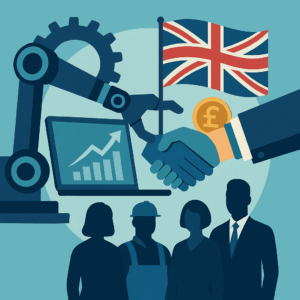
How Artificial Intelligence Is Transforming Work In Great Britain
The UK job market is being restructured at rapid speed by Artificial Intelligence (AI) and automation. Transport, retail, banking and health care are among the sectors taking up technology to make themselves more efficient, lower costs and improve customer service. Yet the changes also raise crucial issues of job security, skills requirements and future work force preparedness.
This article takes a look at how AI and automation are influencing employment in the UK, which industries are experiencing the most changes and adjustments that workers and employers can make in preparation for the rest of 2030 and beyond.

🤖 The Rise of AI in the UK
The UK is deliberately dubbing itself an AI leader in Europe. Over 15% of UK businesses already use AI-infused tools, including the following from the Office for Artificial Intelligence:
- Data analytics and machine learning
- Chatbots and automated customer service
- Fraud detection and pattern recognition
- Self-driving cars (still in weird-gadgets stage of development)
AI is no longer a futuristic notion — it is now an integral part of doing business across the economy.
🔄 Which Sectors Are Most Affected?
Sector | Risk Level | Most Impacted Roles |
|---|---|---|
Transport & Logistics | High | Drivers, delivery workers |
Retail & Supermarkets | High | Checkout operators, shelf stackers |
Banking & Finance | Medium | Customer support, credit assessment |
Healthcare | Medium-Low | Admin and back-office staff |
Technology & IT | Low | Increasing demand for specialists |
📉 What This Means for U.K. Workers
The Bank of England says that as many as 1.5 million jobs could undergo substantial change by 2030. That’s not necessarily mass unemployment, but a huge change in how and where people work.
Key trends include:
- Increased need for digital literacy
- Need for flexibility and lifelong readiness
- Focus on soft skills included human-centric skills, such as communication and critical thinking.
🧑🎓 The Role of Knowledge & Re-Skilling
The UK will need to focus on upskilling and re-skilling to keep pace in an AI-led economy.
Notable government programmes include:
- Skills Bootcamps (short, job-focused training)
- Digital apprenticeships
- The National Skills Fund (NSF) for adult learners
- Free online courses from FutureLearn, OpenLearn and more
Businesses too have a critical role to play, with the creation of training pathways to upskill workers as new technologies come online.
📈 Opportunities Emerging from Automation
So while some jobs are being reconfigured, it is not as if others are not sprouting to life elsewhere.
High-demand roles include:
- Cybersecurity analysts
- Data scientists
- AI and machine learning engineers
- AI governance and ethics and compliance officers
- Digital experience designers
Automation also leads to higher productivity, which may drive economic growth and produce more high-value jobs over time.
🛡️ Getting Ready for the Future of Work
Here is how workers and employers can prepare for the change:
✅ Acquire basic and advanced digital skills (from Excel laying down the foundation for data analysis, coding etc.)
✅ Keep up on tech trends in your industries
✅ Make use of government approved free or subsidised learning platforms.
✅ Keep your CV (as well as your LinkedIn profile) up to date
✅ Employers: Cultivate a culture of lifelong learning
⚠️ Societal and Policy Considerations
And policymakers and institutions also must think about:
Helping transitioning workers
Universal access to digital education
Building a social safety net with modern employment law
Bridging the gap: How to make AI ethical and fair
The government’s National AI Strategy and Digital Strategy 2022–2025 detail some of these objectives — but it will be in the response and flexibility that the key will lie.
🏁 Final Thoughts: Racing to Find Jobs for Artificial Intelligence
AI and automation are changing work in the UK – but it shouldn’t be feared With careful planning, training and support, they can become instruments of economic opportunity, not job loss.
The UK job market in 2030:
✅ More digital
✅ More flexible
✅ More attuned to human-skills
The time to prepare is now. Workers, employers, and institutions must rally around technological change—leaving no one behind as the world of work changes.
Our Post


The Resilient Pound: Navigating the UK’s New Economic Landscape


